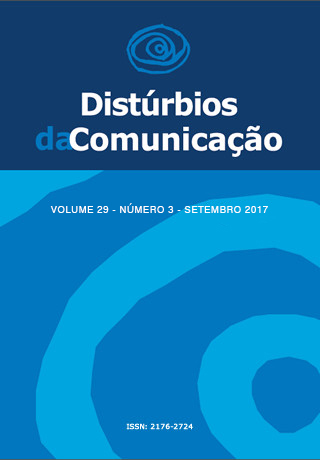Quality of life: comparison between elderly hearing aid users who participated in a support group and those who did not
DOI:
https://doi.org/10.23925/2176-2724.2017v29i3p416-427Keywords:
Quality of life, Aged, Hearing loss, Hearing aids.Abstract
Introduction: communication is a vital need of all human beings; and is directly affected by hearing
loss, particularly among the elderly. In this context, support groups have emerged, to improve their quality
of life. Objective: to compare the quality of life of elderly people users of hearing aids, who participate
in a support group of the Serviço Ambulatorial de Saúde Auditiva (SASA) at a Community University,
with those non-participants. Method: The SF-36 and HHIE-S questionnaires were applied to 27 elderly,
who were divided into two groups – Group 1 (15 elderly individuals non-participants in the support
group), Group 2 (12 participants). Results: there was a prevalence of females (58.33%), the age group
of Group 2 was higher; hearing handicap was present in both groups, but to a lesser extent in Group 2
(66.37%); there was a major difference between the groups on the emotional scale; the perception of
hearing handicap was greater among females (44.44% - 1 and 33.33% - 2); the perception of quality of
life (SF-36) was greater in Group 2 (averages from 45.83 to 91.67); the best average scores in the SF-36
in Group 1 were obtained by the subjects aged 60 to 75 years (39.33% to 86.93%) while in Group 2, the
best average scores were obtained for the age range 75 to 91 years (47.5% to 93.75%). Conclusion: the
higher the age range, the greater the importance of participation in the support group, to improve quality
of life and acceptance of the hearing loss.
Downloads
Downloads
Published
Issue
Section
License
Copyright (c) 2017 Ana Carolina Reis Garcia, Nicole Latoya Flores Citton Campos, Juliana Câmara Bastos, Patrícia Skrsypcsak Garcez Duarte, Débora Frizzo Pagnossin

This work is licensed under a Creative Commons Attribution 4.0 International License.









